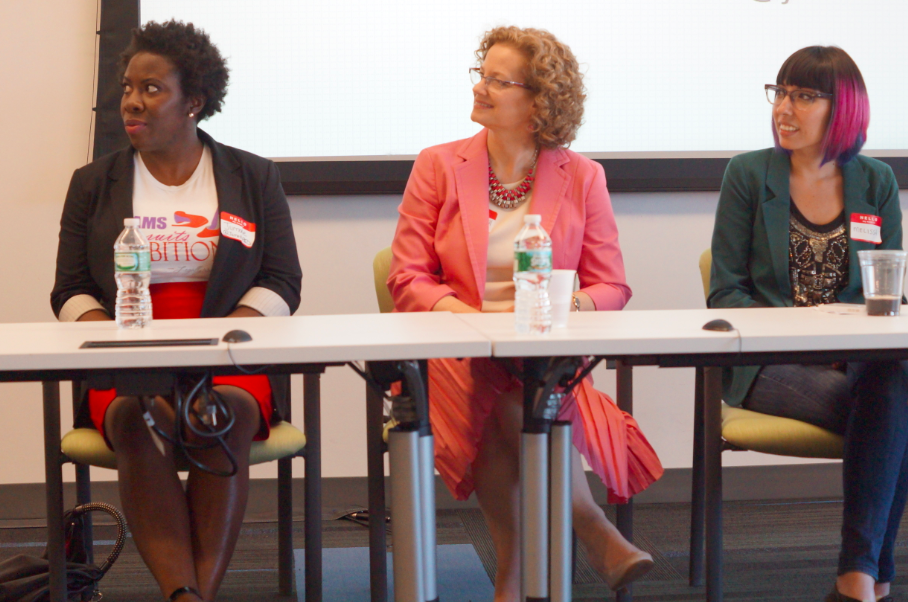Last summer, Melissa Morris Ivone didn’t know what to expect as the only woman on Curalate‘s then-seven-person staff.
Fortunately, the designer found that she didn’t have to worry about sexism. Her main challenge centered around something else entirely.
“The hardest part of being a woman in tech? The bathroom situation,” she said at last month’s “Stories of Women in Tech” event held by Center City recruiting firm Jobspring Partners and Workbridge Philadelphia at the University City Science Center’s Quorum.
When the visual analytics startup was getting its start, it worked out of small Rittenhouse Square office with only one bathroom, Ivone said. The office walls weren’t terribly thick. She remembered going to Barnes & Noble down the street so she could use the bathroom in peace. (Today, Ivone doesn’t have bathroom anxiety, as Curalate moved into First Round Capital‘s space last fall, equipped, quite handily, with male and female bathrooms.)

Elise Wei, technical lead at Monetate, said she hasn’t experienced any tension with men while supervising them. Photo by Lisa Yoder.
Ivone explicitly acknowledged that she hadn’t had any encounters with sexism, and the four other speakers at the event followed suit to varying degrees. When asked, Elise Wei, technical lead at Monetate, said hadn’t experienced any tension or discomfort while managing men at Monetate.
The other speakers didn’t mention any negative experiences, though Signature RED founder Jumoke Dada did say that, as a young developer and systems analyst at a human resources firm, she had to be more assertive in meetings and persistent with requests for resources to move projects along. But it wasn’t clear that this was connected to her gender, Dada said.
Still, being a woman in tech comes with its own challenges, the speakers said.
If Wei hears an off-color comment at work, she’ll call her colleague out. Many men in the tech world haven’t spent a lot of time working with women, she said. So sometimes you just need to remind them what’s appropriate and what’s not.
Both technical leads at the Conshohocken startup are women, said Wei, who was recently promoted to the leadership position. That may have something to do with women generally being better at communicating and at being empathetic, she said.

Jessica Ivins, UX designer at AWeber, said she’s not fazed when it comes to salary negotations. Ask for what you’re worth, she said. Photo by Lisa Yoder.
For Sue Grinius-Hill, who spent nearly two decades in various roles at Microsoft, it was the geeky man stereotype that turned her off to technology.
“When I got started, computing was…men with little short sleeves and pocket protectors. I didn’t want that.”
She wanted to be a teacher instead. Grinius-Hill, who recently finished a stint as CTO/COO for online law education startup Apprennet, fell into technology when she was asked to start a computer center at a community college in Idaho.
Despite her generally positive experience as a woman in tech, Ivone remembers feeling bewildered — and outnumbered — at her first Philly Startup Weekend. There were four women out of the 130 people at the mixer held on the first night of the event, she said.
So when two guys told her she’d be popular at the event, Ivone snapped back, “Why? Because I’m a girl?”
But it was actually because she was a designer. Designers are rare at Startup Weekends, she soon learned. Ivone, now an organizer of Philly Startup Weekend, remembers feeling mortified and like a victim of her own stereotypes.
“Those gender barriers were there because I put them there myself,” she said.
Read more coverage of the event on Purple Car.
Before you go...
Please consider supporting Technical.ly to keep our independent journalism strong. Unlike most business-focused media outlets, we don’t have a paywall. Instead, we count on your personal and organizational support.
Join our growing Slack community
Join 5,000 tech professionals and entrepreneurs in our community Slack today!

The person charged in the UnitedHealthcare CEO shooting had a ton of tech connections

The looming TikTok ban doesn’t strike financial fear into the hearts of creators — it’s community they’re worried about

Where are the country’s most vibrant tech and startup communities?


